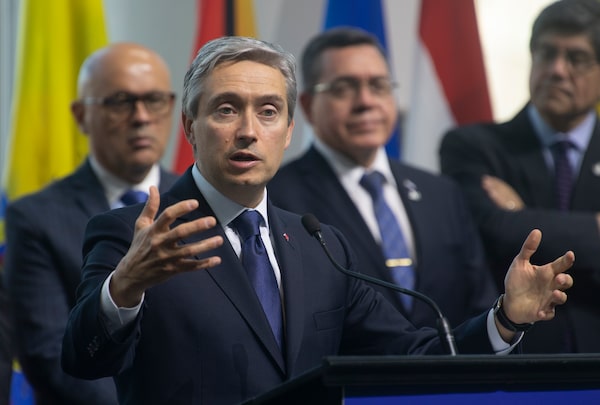
Foreign Affairs Minister François-Philippe Champagne, seen here on Feb. 20, 2020, said last week that he saw 'more flexibility from the Chinese authorities in the second flight' because they allowed a number of permanent residents to board.Adrian Wyld/The Canadian Press
Bruce Su is stuck in an apartment in Wuhan, forbidden from going out. To get groceries, he needs to register with local community officers and the food is delivered to his building.
But that’s not the worst part. The 29-year-old sprinkler fitter hasn’t earned a penny since the visit to his family in mid-January, but bills for rent, car insurance and cellphone back in Canada keep rolling in.
“My financial loss is huge.”
After an outbreak of the coronavirus and lockdowns in Hubei province, where Wuhan is located, the Canadian government sent two charter flights to evacuate more than 400 Canadian citizens and their accompanying family members. But while some permanent residents were able to join the flights, Mr. Su and others were not.
Canadian officials have said China only allows foreign nationals travelling with minors to leave. However, some permanent residents were able to board the second flight even without a minor, while others were not, raising still-unanswered questions about the selection process.
Monte Gisborne, in Coquitlam, B.C., welcomed his wife, Danni Luo, and nine-year-old daughter, Qinlin Li home after both made it onto the second flight. They are both permanent residents.
Mr. Gisborne’s loved ones were trapped in a condo near downtown Wuhan. To help his family flee the city, Mr. Gisborne had been using social media to press the Canadian government.
“I had to yell and scream loudly to my government, through the media, to get them to react to this and get my family home.”
Foreign Affairs Minister François-Philippe Champagne said last week that he saw “more flexibility from the Chinese authorities in the second flight” because they allowed a number of permanent residents to board.
Sylvain Leclerc, a spokesperson at Global Affairs, said the Canadian government “worked assiduously with Chinese authorities to keep families together, even when a Canadian minor was not departing on the flight.”
However, he added the assurances they received from the Chinese authorities only applied to families travelling with minors.
The Chinese embassy in Ottawa did not reply to requests for comment. Chinese foreign ministry spokeswoman Hua Chunying said on Feb. 7 that “for Chinese nationals who are lineal relatives of foreign citizens in Wuhan, if they want to leave and also have valid international travel documents, they can leave with their families.”
Lei Chao, a permanent resident living in Quebec for about 18 years, also left on the second Canadian flight. Mr. Lei said he made repeated requests to the Canadian officials, stating he has business to take care of and need to reunite with his wife and child.
But many other permanent residents stranded in Wuhan, who were desperately hoping the Canadian government would offer help, ended with disappointment.
Coquitlam, B.C., resident Tao Li said she had been seeking help from Canadian authorities before the second flight took off. She knew that her parents, who had been living in the province for about six years, were not likely to be accepted aboard the plane, but she still made repeated efforts.
Her father, 74 and mother, 70, didn’t manage to leave. Ms. Tao, a Canadian citizen, said the elderly couple are suffering from chronicle diseases and relying on medication.
They are “living in the place that has been hit the most,” she said. “... We feel tortured and hopeless almost every day.”
In Ottawa, Lisa Yu is also urging the Canadian government to take more action. Her parents, who are permanent residents, are stuck in Wuhan and her mother, 66, is running out of medication that regulates blood pressure and other chronic conditions.
Lorne Waldman, an immigration and refugee lawyer based in Toronto, said Canada has very limited standing to press China with how to deal with Chinese citizens who are living in China.
“Legally, [Canada doesn’t] have a lot of standing to be able to make representations because they’re citizens of China, they’re not citizens of Canada.”
Mr. Su, who lives in Richmond, B.C. said he hopes Canada would offer further assistance to people like him even though he feels the chances are slim.
“I don’t know when this is going to end.”
We have a weekly Western Canada newsletter written by our B.C. and Alberta bureau chiefs, providing a comprehensive package of the news you need to know about the region and its place in the issues facing Canada. Sign up today.
 Xiao Xu
Xiao Xu